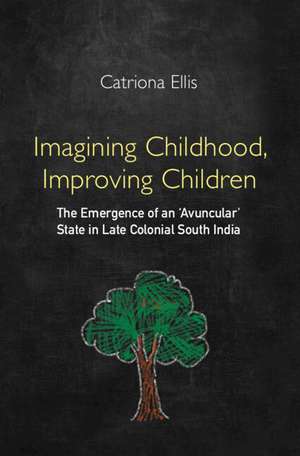Imagining Childhood, Improving Children: The Emergence of an ‘Avuncular’ State in Late Colonial South India
Autor Catriona Ellisen Hardback – 23 aug 2023
Preț: 696.19 lei
Preț vechi: 765.05 lei
-9% Nou
Puncte Express: 1044
Preț estimativ în valută:
133.22€ • 140.69$ • 110.86£
133.22€ • 140.69$ • 110.86£
Carte disponibilă
Livrare economică 21 decembrie 24 - 04 ianuarie 25
Livrare express 10-14 decembrie pentru 35.41 lei
Preluare comenzi: 021 569.72.76
Specificații
ISBN-13: 9781009215206
ISBN-10: 1009215205
Dimensiuni: 158 x 235 x 25 mm
Greutate: 0.59 kg
Ediția:Nouă
Editura: Cambridge University Press
Colecția Cambridge University Press
Locul publicării:Cambridge, United Kingdom
ISBN-10: 1009215205
Dimensiuni: 158 x 235 x 25 mm
Greutate: 0.59 kg
Ediția:Nouă
Editura: Cambridge University Press
Colecția Cambridge University Press
Locul publicării:Cambridge, United Kingdom
Recenzii
'This book represents a far-reaching and perceptive investigation into the making of childhood in late colonial Madras Presidency. Meticulously researched and very readable, it provides insightful and nuanced analysis of how debates around colonial modernity and indigenous familial relations and networks played out in constructions of childhood citizenship.' Talat Ahmed, University of Edinburgh
'A highly original and illuminating study on the development of a universal ideal of modern childhood in South India, dating back to the 1920s, when state policy toward children was shaped through a lens of child-saving and new experiences of governance. Employing child-centric theory, Ellis explores how policymakers viewed children as both objects to be saved and investments as future citizens. The book insightfully highlights the influence of caste, class, gender, and religion on childhood policies, exposing intellectual inconsistencies. Ellis also contrasts adult intentions and actions with the autobiographical memories of Indian childhoods, revealing the complex realities of childhood relationships with school, family, and peers. The book raises important new themes and agendas for the writing of Indian social history in the twentieth century.' Crispin Bates, University of Edinburgh
'A highly original and illuminating study on the development of a universal ideal of modern childhood in South India, dating back to the 1920s, when state policy toward children was shaped through a lens of child-saving and new experiences of governance. Employing child-centric theory, Ellis explores how policymakers viewed children as both objects to be saved and investments as future citizens. The book insightfully highlights the influence of caste, class, gender, and religion on childhood policies, exposing intellectual inconsistencies. Ellis also contrasts adult intentions and actions with the autobiographical memories of Indian childhoods, revealing the complex realities of childhood relationships with school, family, and peers. The book raises important new themes and agendas for the writing of Indian social history in the twentieth century.' Crispin Bates, University of Edinburgh
